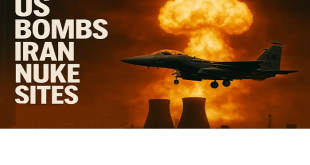Whoever wins the White House in November will be forced to make stark U.S. foreign policy choices.
On top of ongoing conflicts in Europe and the Middle East and rising tensions in the Indo-Pacific, the next administration will inherit structural domestic and international obstacles that have been mounting for decades. Addressing these challenges while keeping our current U.S. foreign policy strategy on autopilot simply won’t cut it—it is time for a new approach.
Since America’s victory in the Cold War, our national security elites in both parties have avoided asking fundamental questions about what missions the United States should be engaged in. These experts insist that maintaining a heavy military footprint across Europe, the Middle East, and Asia simultaneously is necessary for American security.
Focusing on how to resource these missions without reflecting on their wisdom or sustainability misses the forest for the trees. Twenty years of open-ended nation-building efforts in the Middle East cost thousands of service members’ lives. These conflicts also came at the price of $6 trillion, damaged American military readiness, and aided our great power rivals by diverting our focus and energy.
After decades of deficit spending, our national debt is approaching $36 trillion, a ten-fold increase from the end of the Cold War. After the COVID pandemic, our nation’s debt hadn’t been so large in relation to our economy since the Second World War. At this point, our interest payments alone are exceeding U.S. defense spending from this year.
On top of these challenges, the trust funds for our biggest domestic programs—Social Security and Medicare—are on track to be insolvent in a decade and impose benefits cuts unless the next administration makes difficult domestic choices to secure their future.
Taken together, the United States now experiences a strategic scarcity that our national security class has not had to deal with for generations.
We cannot buy our way out of these constraints, as the Commission on the National Defense Strategy recently called for. Voters, especially in swing states, are already disillusioned with America’s level of involvement in conflicts abroad. Americans are not going to make the painful fiscal sacrifices needed to secure our financial future only to see trillions more squandered on flawed defense strategies.
In the face of these challenges, Concerned Veterans for America’s new report, “Realism in Practice,” offers a fresh, disciplined path forward for U.S. foreign policy, rooted in assessing our strategic situation as it is, not as we might wish it to be.
American strategic goals need to align with America’s available resources. Policymakers also need to use the right tools to achieve these goals, avoiding overreliance on an already overstretched, undermanned military. Our allies can and should take greater responsibility for their own defense. The United States needs to concentrate its military resources on regions most vital to its core interests, while relying more on diplomatic and economic engagement elsewhere.
The next president should insist on maintaining a world-class military tailored to meet our principal threats. Nevertheless, our next commander-in-chief should stop repeating our decades-old blunder of turning to our armed forces first to solve too many problems. Shrewd diplomatic and economic overtures to potential partners can be more effective methods for pursuing many of our objectives, and these approaches will be increasingly necessary in an environment of limited defense budget growth.
The next president also needs to make real choices about regional prioritization and reconsider which military deployments are most important.
As American energy production rises, the Middle East matters less to us. The United States can neutralize credible terror threats to our homeland, protect shipping lanes, and sustain diplomatic efforts like the Abraham Accords without 40,000 troops across the region.
In Europe, our wealthy allies have been capable of spending more on their own defense for decades. NATO-Europe collectively outclasses Russia in wealth, population, and latent military strength. Our allies should be taking primary responsibility for their own security and for arming Ukraine, while the U.S. role in Europe shifts to one of logistical support. Excessively “reassuring” NATO has sapped European political will to invest in adequate defense while diverting resources needed elsewhere.
Leaning on our partners and allies to step up more in other regions will give our military greater ability to concentrate on more important long-term U.S. interests in Asia. Here, the United States should grow economic ties with our partners and allies while equipping countries like the Philippines and Taiwan with the anti-air and anti-ship defensive systems necessary to deter China.
Whether they like it or not, the next president will confront severe challenges at home and abroad. These challenges will demand hard choices. Squandering our national power on ill-considered deployments is no longer an option. American policymakers will need a more disciplined mindset about when using military force is effective and will have to lead with diplomatic and economic overtures more often as constraints mount. Congress should act as a safeguard as well, only authorizing military missions with clear objectives and ties to our national interests.
A principled foreign policy approach guided by core American national interests built our country’s strength. To ensure that the United States remains strong, secure, and prosperous in the decades to come, the next president should put realist principles into practice.
By: Tyler Koteskey
Tyler Koteskey is Policy Director at Concerned Veterans for America and author of “Realism in Practice: A Strong, Sustainable American Strategy for the 21st Century.”
 Tehran Institute For International Studies tiis
Tehran Institute For International Studies tiis



